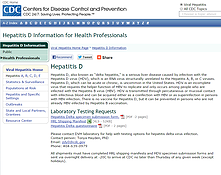Hepatitis D Information for Health Professionals

Hepatitis D, also known as “delta hepatitis,” is a serious liver disease caused by infection with the Hepatitis D virus (HDV), which is an RNA virus structurally unrelated to the Hepatitis A, B, or C viruses. Hepatitis D, which can be acute or chronic, is uncommon in the United States. HDV is an incomplete virus that requires the helper function of HBV to replicate and only occurs among people who are infected with the Hepatitis B virus (HBV). HDV is transmitted through percutaneous or mucosal contact with infectious blood and can be acquired either as a coinfection with HBV or as superinfection in persons with HBV infection. There is no vaccine for Hepatitis D, but it can be prevented in persons who are not already HBV-infected by Hepatitis B vaccination.
